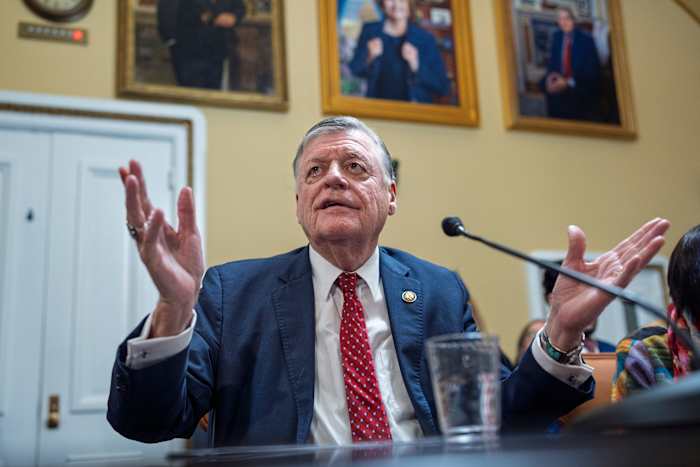In a surprising twist of political events, the U.S. House of Representatives has managed to pass a crucial government funding bill, showcasing a newfound unity among House Republicans. This shift comes under the influence of President Donald Trump’s “DOGE” strategy, a bold move aimed at reducing the size and scope of federal government. This article delves into the dynamics of this political upheaval, the role of key figures like Elon Musk, and the potential implications for the American public.
The DOGE Strategy: A New Direction for House GOP
The House GOP, traditionally known for internal strife and difficulty in passing legislation, has found a new rallying cry in Trump’s DOGE initiative. Spearheaded by House Speaker Mike Johnson, this strategy has not only kept the government running but also convinced even the most conservative members of the Freedom Caucus to support the bill.
Trump’s Influence and the Role of Elon Musk
President Trump’s public pressure on lawmakers played a significant role in this unity. His warnings of political retribution against dissenters within the party were sharp and effective. However, it’s not just Trump’s influence that swayed the GOP; the actions of billionaire Elon Musk, who is leading the charge in downsizing federal agencies, have also been pivotal.
Musk’s Department of Government Efficiency has already begun slashing the workforce, with notable cuts at the Department of Education, which recently reduced its staff by half. This aggressive approach to reducing government size has resonated with many Republicans, who see it as a fulfillment of long-standing promises to downsize federal operations.
The Impact of DOGE on Federal Agencies
The DOGE strategy’s impact on federal agencies has been swift and significant. For instance, the Department of Education’s drastic reduction in staff is just the beginning of what the administration promises to be a broader overhaul of government operations.
- The Department of Education cut 1,300 employees, about half its staff.
- More agencies are expected to follow suit in the coming months.
Speaker Johnson hailed these efforts as crucial for the American people, emphasizing that downsizing the federal government would ultimately benefit taxpayers.
Political Repercussions and Democratic Response
The Democrats, currently in the minority in both the House and Senate, are scrambling to respond to this new GOP unity. Senate Democratic leader Chuck Schumer faces a tough decision: support the bill to avoid a government shutdown or oppose it and risk the political fallout.
Democrats have long used the narrative that Republicans are incapable of governing effectively. However, this recent display of GOP cohesion challenges that narrative, leaving Democrats to warn about the potential consequences of Trump and Musk’s actions.
Democratic Concerns and Public Reaction
Democratic leaders like Schumer and Rep. Katherine Clark have expressed strong opposition to the GOP’s actions. Clark criticized the Republicans for handing a “blank check” to Elon Musk, suggesting that the public did not vote for such drastic measures.
The public’s reaction has been mixed, with some praising the GOP for finally taking decisive action, while others are concerned about the potential loss of essential services and programs.
Future Plans: Tax Cuts and Spending Reductions
Trump has urged Congress to pass what he calls a “big beautiful bill” that includes significant tax cuts and spending reductions. This proposed legislation would cut $4.5 trillion in taxes and $2 trillion in spending, targeting programs like Medicaid and agriculture, including food stamps.
Elon Musk has also suggested that Social Security and other entitlement programs need drastic cuts, further fueling the debate over the future of these essential services.
Republican Unity and the Path Forward
The GOP’s unity on this issue marks a significant shift from previous years. Almost every House Republican, along with one Democrat, Rep. Jared Golden of Maine, supported the government funding bill. This unity extends to their approval of a budget framework last month, setting the stage for further action on tax and spending cuts.
Speaker Johnson has announced that the White House will soon send a rescissions package, which aims to roll back already-approved funding across the federal government. Some Republicans are also pushing for the Trump administration to impound other federal funds, potentially setting up a legal showdown over constitutional powers.
Conservative Support and Internal Dynamics
Conservative members of the GOP, often known for their resistance to funding bills, have expressed a willingness to stand down in light of Trump and Musk’s aggressive actions. Rep. Chip Roy of Texas and Rep. Andrew Clyde of Georgia, both known for their opposition to government spending, have indicated support for the current strategy.
Rep. Tom McClintock of California, a longtime deficit hawk, summed up the sentiment among many Republicans: “In DOGE we trust.” This trust in Trump and Musk’s approach has led to a more unified GOP front than seen in recent years.
Trump’s Direct Influence on GOP Members
Trump’s direct involvement in pushing the funding package has been notable. He personally berated Rep. Thomas Massie of Kentucky, the lone Republican holdout, and reached out to other lawmakers to ensure their support.
Massie, known for his consistent stance on reducing government debt, remained steadfast in his opposition. However, other Republicans, like Rep. Rich McCormick of Georgia, expressed a desire to see Trump succeed, even if they did not receive a personal call from the president.
The Broader Implications for American Governance
The GOP’s embrace of the DOGE strategy represents a significant shift in American governance. It challenges the traditional narrative of Republican disunity and highlights the potential for rapid, sweeping changes in government operations.
As the bill moves to the Senate, where Republicans hold a majority, Democrats face a challenging political landscape. Their ability to influence the outcome remains limited, leaving them to focus on warning the public about the potential consequences of these actions.
The American people now face a critical juncture. The GOP’s actions could lead to a leaner, more efficient government, but at the cost of essential services and programs that many rely on. The debate over the DOGE strategy and its implications will undoubtedly continue to shape the political landscape in the coming months.
In conclusion, the House GOP’s embrace of Trump’s DOGE strategy marks a pivotal moment in American politics. It showcases a newfound unity among Republicans, driven by the promise of significant government reform. As the nation watches these developments unfold, the future of federal operations and the services they provide remains uncertain, sparking a crucial conversation about the role and size of government in the 21st century.
Source: internewscast.com

